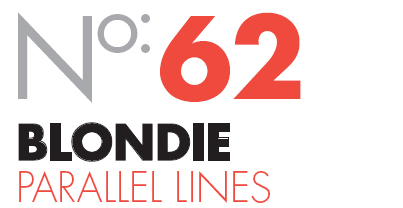
Chrysalis
Produced by Mike Chapman
Released: September 1978
TRACKLISTING
01 Hanging on the Telephone
02 One Way or Another
03 Picture This
04 Fade Away and Radiate
05 Pretty Baby
06 I Know But I Don’t Know
07 11:59
08 Will Anything Happen?
09 Sunday Girl
10 Heart of Glass
11 I’m Gonna Love You Too
12 Just Go Away
Two pips of a telephone ringing down the line and then a tough-as-nails declaration, as the guitars chime in, that ‘I’m in the phone booth it’s the one across the hall/If you don’t answer, I’ll just ring it off the wall’. That is Debbie Harry beginning Blondie’s third album, a record that would swiftly take them from the periphery to superstardom. Parallel Lines would go on to sell 20 million copies, making it the iconic commercial face of the new wave scene and taking Blondie from the seedy confines of CBGBs to the expansive Madison Square Garden.
Blondie wouldn’t take no for an answer on ‘Hanging on the Telephone’ and it was the same with Parallel Lines. This was pop as a joyous invocation and a tart putdown; this was tough cookie music. Blondie had had the right elements, but not the finish, on their 1976 self-titled debut and 1978’s Plastic Letters. And despite successful singles in Australia and Britain they were unknown at home. Part of the solution was Mike Chapman, the Australian-born producer who’d cut a swathe through the British charts with bubblegum glam bands and brought a serious work ethic with him to New York’s Record Plant studio.

‘The group didn’t know what hit them,’ Chapman wrote in his liner notes to the album’s 2001 reissue. ‘I was a taskmaster when I worked. Everything had to be as good as it possibly could be.’ Blondie had an offhand charm, but Chapman wasn’t interested in that stance taking hold in the studio. Working with the band – Harry, her partner and lead guitarist Chris Stein, guitarist Frank Infante, bassist Nigel Harrison, keyboardist Jimmy Destri and drummer Clem Burke – he helped forge a fusion of punk energy and girl group mystique, street smarts and disco dreams.
Genres were rendered irrelevant on Parallel Lines. On the burbling autobahn rhythms of ‘Heart of Glass’, where Harry leaves a trail that Madonna would follow a few years later, Blondie set romantic disillusionment to dancefloor grooves, while ‘Pretty Baby’ was a ’56 in ’76 mash-up of new wave guitars and doo-wop breakdowns that served as a contrast to the eerie art-rock monument that is ‘Fade Away and Radiate’. The spread was also a reflection of the songwriting options. The Harry/Stein team was augmented by contributions from Destri, Harrison and Infante – the latter’s ‘I Know But I Don’t Know’ is rock & roll pomp with disparate but electrifying elements that predate sampling.
‘One way or another, I’m going to find you,’ sings Harry on ‘One Way or Another’, and it’s one of many songs where she played herself as the pursuer; a woman of action at odds with the sex kitten image that had started to cling to her. As the music attained a studio sheen she began to celebrate her imperfections, and Harry’s vocal performances are evocative and eclectic: wary but exposed on ‘Pretty Baby’, yearning on Destri’s breakneck ‘11:59’ and levelling doubts with ‘Picture This’.
Stein’s lead guitar licks were mixed up beside Harry’s vocals, making for an album where no single voice dominates. Blondie would struggle to get that balance again (Chapman’s liner notes delineate the various rivalries that would eventually become untenable). But any claim that they were simply a great singles band who couldn’t last an entire album is repudiated by Parallel Lines. This was pop music made for and by adults and it still feels reliably straight up. Don’t be fooled by Debbie Harry’s stern demeanour on the cover – the record has winning ways.